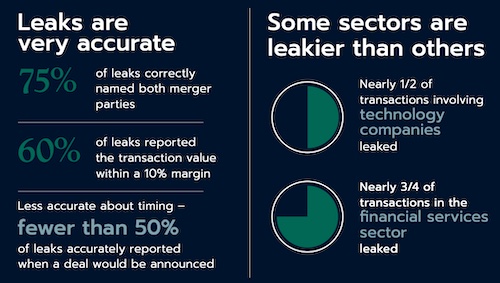 |
Call in the plumbers… More than one-third of major deals made during the past six years were publicly reported in the media prior to the official corporate announcement, according to the “When Deals Spring a Leak” study by H/Advisors Abernathy.
Seventy percent of mega-mergers (e.g., deals valued at $15B and higher) were leaked during the first-half of 2022. Those leaks resulted in media coverage that ran 28 days before the eventual announcement.
Though rumors of impending deals without naming the specific seller or buyer frequently circulate in the media, Abernathy found that in top-tier media, 75 percent of the stories included the names of both companies involved in the transaction.
Abernathy suggests that both buyer and seller should assume that leaks are going to happen and that the online spotlight will glow more brightly.
“Mentions on social media for companies named in a deal leak increased an average of 372 percent in the five days following a leak, and searches related to the deal and its corporate entities surged an average of 102 percent in the 30 days following a leak.”
Abernathy recommends that communicators, who are often kept at arm’s length in early deal talks, be brought into the process.
A small group of PR people can “add real value by serving as an early warning on leaks, managing leaks if they arise and setting a framework to maximize any announcement.”
 |
The typical scenario: negotiators tend to put their heads down and frantically work to iron out a deal after it has been leaked.
Abernathy counters that communicators should work heads up in the new reality of unwanted disclosures.
“Leaks start the conversation with stakeholders, even if the company isn’t speaking. The best announcements recognize that fact and find a way to join the conversation with stakeholders to gain their acceptance and support.”
For its research, Abernathy analyzed 399 transactions valued at $5B or greater where at least one buyer or seller was based in the US.
Back to the Future… Marketers aren’t big fans of America’s economic malaise, which stands in sharp contrast to the global financial meltdown of 2007 to 2009 and the 1970s oil embargo crisis that were marked by high unemployment and inflation.
Group M, which is WPP’s media investment unit, believes the US economy seems to be running in place.
In its “This Year. Next Year” global forecast, GroupM notes: “The economy has proved fairly resilient, walking the line between incurring enough 'pain' to appease the Federal Reserve in its quest to curb inflation, but not tipping into a recession.”
The shop compares today’s uncertain US economic outlook to the periods following WWII and the Korean War during which America was weaning itself off the government-driven industrial production and stimulus money flowed into the market.
Prices increased 15 percent during the first-half of 1946 as wartime price controls were lifted, returning soldiers drove up demand and global shortages occurred.
The US suffered mild recessions as GDP declined 1.1 percent in 1947 and by 0.6 percent in 1954.
GroupM makes the argument that the US is in the midst of a global post-COVID-19 “war” period, marked by the after-effects of government fiscal policy and supply chain disruptions.
“That's why we are not seeing the universal downturn—not yet anyway—of 2008 or even 2001, despite most companies reminding us that they are proceeding with an abundance of caution,” it states.
The firm acknowledges that a real and continuing war is raging in Europe, where individual countries are facing more challenging trends than the US.
GroupM downgraded global ad growth for 2022 from the 8.4 percent that it had projected in June to 6.5 percent, mainly due to the collapse of the China market.
Barring an escalation of the war in Ukraine or the rise of another pandemic, GroupM forcests 5.9 percent growth in the global ad market for next year and 6.2 percent in 2024.
We will take it.


 Republican tough guys Josh Hawley and Tom Cotton want Biden to send the National Guard to Columbia University to put an end to student protests... Bernie blasts Bibi for insulting America's intelligence by equating criticism of Israel's government with antisemitism... German court convicts former financial PR exec who claims he wasn't aware that trading on tips is illegal.
Republican tough guys Josh Hawley and Tom Cotton want Biden to send the National Guard to Columbia University to put an end to student protests... Bernie blasts Bibi for insulting America's intelligence by equating criticism of Israel's government with antisemitism... German court convicts former financial PR exec who claims he wasn't aware that trading on tips is illegal.  Southern governors claim they know what's best for their working class, and it's not pay raises... A Ukrainian human rights group played a key role in convincing House Speaker Mike Johnson to hold a vote to send arms to Ukraine, Israel and Taiwan... Trump Media & Technology Group blames short-selling and not lousy outlook for its stock slump.
Southern governors claim they know what's best for their working class, and it's not pay raises... A Ukrainian human rights group played a key role in convincing House Speaker Mike Johnson to hold a vote to send arms to Ukraine, Israel and Taiwan... Trump Media & Technology Group blames short-selling and not lousy outlook for its stock slump. The techniques deployed by OJ Simpson's defense team in the 'trial of the century' served as a harbinger for those used by Donald Trump... People worry about the politicization of medical science just as much as they fret about another pandemic, according to Edelman Trust Barometer... Book bans aren't restricted to red states as deep blue Illinois, Connecticut and Maryland challenged at least 100 titles in 2023.
The techniques deployed by OJ Simpson's defense team in the 'trial of the century' served as a harbinger for those used by Donald Trump... People worry about the politicization of medical science just as much as they fret about another pandemic, according to Edelman Trust Barometer... Book bans aren't restricted to red states as deep blue Illinois, Connecticut and Maryland challenged at least 100 titles in 2023. The NBA, which promotes legalized gambling 24/7, seems more than hypocritical for banning player for placing bets... Diocese of Brooklyn promises to issue press release the next time one of its priests is charged with sexual abuse... Truth Social aspires to be one of Donald Trump's iconic American brands, just like Trump University or Trump Steaks or Trump Ice Cubes.
The NBA, which promotes legalized gambling 24/7, seems more than hypocritical for banning player for placing bets... Diocese of Brooklyn promises to issue press release the next time one of its priests is charged with sexual abuse... Truth Social aspires to be one of Donald Trump's iconic American brands, just like Trump University or Trump Steaks or Trump Ice Cubes. Publicis Groupe CEO Arthur Sadoun puts competition on notice... Macy's throws in the towel as it appoints two directors nominated by its unwanted suitor... The Profile in Wimpery Award goes to the Ford Presidential Foundation for stiffing American hero and former Wyoming Congresswoman Liz Cheney.
Publicis Groupe CEO Arthur Sadoun puts competition on notice... Macy's throws in the towel as it appoints two directors nominated by its unwanted suitor... The Profile in Wimpery Award goes to the Ford Presidential Foundation for stiffing American hero and former Wyoming Congresswoman Liz Cheney.


 Have a comment? Send it to
Have a comment? Send it to 
Dec. 7, 2022, by Joe Honick
Circumstances differ and also confuse. At the end of those wars, 2008 catastrophes and the pandemic, we did not have a Russian attempted slaughter of Ukraine that has kept us spending and producing lots of defense stuff.
At other times we did not have incessant right wing political assaults on government, with Ukraine policy in danger. If ultra right Republicans carry out revenge using Ukraine interference, we will have much more than advertising to fear with Biden’s fantastic martialing of NATO support possibly collapsing.
Vulgarity of the Georgia campaign, Trump’s accommodating anti-Semites as if he did not know them opening doors to still more support for such activity and calls for revenge from Jim Jordan and Kevin McCarthy all bode ill internationally as well.
The “situation” calls for a feature analysis all its own in these pages if only because so much of public opinion will be tested.